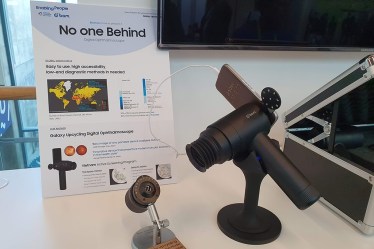Samsung on Wednesday announced that it is bringing its Galaxy Upcycling programme to India in a bid to offer affordable eye-care solution to the masses. Galaxy Upcycling is an innovative concept that repurposes old – not in use – Galaxy smartphones and turns them into portable retinal cameras to diagnose eye disease at a fraction of the cost of commercial instruments.
The programme was first launched in Korea in 2017. Through it, Samsung intends to utilise Galaxy devices to make positive impact on the society, including environmental sustainability. In 2018, it partnered with the International Agency for the Prevention of Blindness (IAPB) and Yonsei University Health System (YUHS) to create a special “EYELIKE handheld fundus camera” that, when attached to a Galaxy smartphone, can screen for eye disease.
“The combination of using multiple optical technologies and artificial intelligence, coupled with camera performance of a Galaxy smartphone, created an affordable medical device that was just as capable as a fundus camera used by medical professionals. This not only solved a health issue, but a growing environmental concern as well,” Dr. Sangchul Yoon of Yonsei University Health System said.
The smartphone, in this case, serves as both the brains as well as the eyes in a way, to capture, analyse and diagnose images for ophthalmic diseases using an artificial intelligence algorithm. A dedicated mobile application meanwhile collates this data and suggests a treatment regimen. Samsung claims it can detect a wide range of conditions from diabetic retinopathy, glaucoma, to age-related macular degeneration.
“In the countries where the EYELIKE Platform is trialed, difficult terrain, long distances and remote populations all contribute to the need for technology to help us connect and improve access to care,” said Drew Keys, Western Pacific Region (WPR) Coordinator at IAPB.
The programme is said to have benefited the lives and vision of more than 19,000 residents in Vietnam and going forward, as Samsung pilots it in more countries, it plans to address approximately 1 billion global cases of vision impairment that would be otherwise preventable with proper diagnosis. Samsung is expanding the programme to include Morocco and Papua New Guinea alongside India and it is also simultaneously working to broaden its capabilities to screen for cervical cancer – again, with the help of a Galaxy smartphone – and improve women’s accessibility to quality health care.
To be clear, Samsung has only announced its India expansion plans at this point of time. An exact date of availability and pricing of the equipment, aka EYELIKE handheld fundus camera, will be disclosed closer to launch. But from what we hear, anybody will be able to buy this equipment and use it for diagnosis at home.
Also Read | Samsung Galaxy S21 Ultra first look, impressions: Tall, dark and noteworthy
